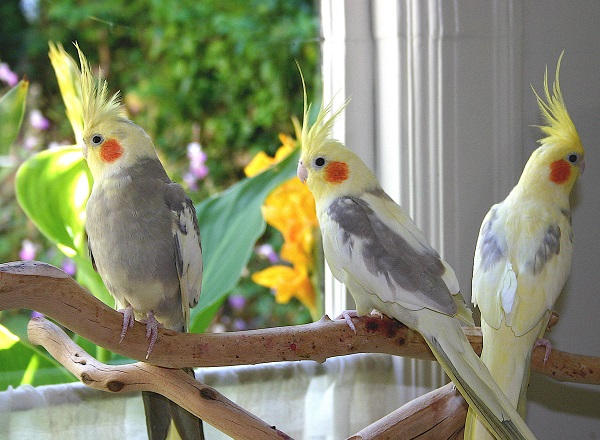-

-
Bird Care
Birds
Most birds like the company of their own kind so it is wise to consider buying more than one, but birds kept in groups prefer to interact with each other rather than their owner. Therefore if you wish to teach a budgie or cockatiel to talk it is best to keep one alone.
  
|
| All About Your Pet
|
Choosing Your Pet
|
Home & Equipment
|
Feeding
|
Taming & Handling
|
Exercise & Play
|
Cleaning
|
Health
|
Did You Know?
|
All birds need plenty of space to fly around in, so buy the biggest cage you can afford making sure it is suitable for the species you have chosen to keep. Ensure the space between the bars of the cage will not allow your bird to get their head through and that the thickness of the bars should be enough so that the bird cannot bend them i.e thicker bars for bigger birds. Parakeets and budgies must have some horizontal bars to allow for climbing and round cages or those with purely vertical bars are only suitable for finches and canaries.
The base of the cage needs to be covered with a litter or bird sand to collect droppings and other mess. This will need to be replaced when soiled and the entire cage should be cleaned weekly using a pet safe disinfectant spray.
Most cages come with perches to allow your bird to hop or fly between them but it is always worth buying more in a variety of thicknesses. Perches provide fun as well as exercise for your bird’s feet and can help keep claws worn down too.
Toys are an essential addition to any bird’s cage and help to keep them entertained, especially when you are not around for company. There are many types of toys available but only provide one or two at a time, changing them regularly. All parakeets and budgies enjoy toys, particularly those that stimulate preening or that they can pull to pieces.
Birds like to bathe and access to water helps them to maintain their plumage. You may want to attach a bird bath to your cage, or alternatively you can use a plant sprayer, providing it has never previously been used with any chemicals. Always use warm water and bathe them early enough in the day to allow time for your bird to dry off before they go to sleep.
Birds should be kept in a room where they will get some contact with you during the day or evening but never in the kitchen; as well as possible risks to human health, Teflon coated pans and self cleaning ovens can give off fumes if they are overheated which are extremely toxic to birds. Extremes of temperature and particularly draughts must be avoided so conservatories and hallways can be similarly unsuitable places for them.
Once you have purchased your bird you must let it settle into its new cage and surroundings for a few days, then start by sitting next to the cage and letting the bird get used to you. Remember not to make any sudden movements as birds are easily frightened. Find out what your bird likes to eat and start to offer this through the bars by hand, although it may take many days for the bird to take the food from you. Once the bird will take food through the bars you can try putting your hand in the cage, hopefully then it shouldn’t be too long until the bird will step onto your hand.
Only at this point should you allow the bird out of its cage; if it is not comfortable stepping onto your hand and you have to catch the bird to put it back in its cage, whatever trust you have built up will be lost.
Remember to be aware of hazards around the home. One of the biggest causes of injury to pet birds is flying into windows. The main thing to remember is that these birds will not become tame overnight, demanding a lot of patience and time. If you persevere the hard work and effort will be well worth it in the end.
Your bird’s cage should be thoroughly cleaned at least once a week using a pet safe disinfectant. Food and water bowls should be cleaned daily as should the perches if they become soiled.
Given the correct care and attention birds are usually problem free. As with all pets the emphasis should be on maintaining clean and hygienic conditions.
Birds are very good at hiding illness. In the wild sick birds would be picked off by predators. This can make it very difficult to tell when your bird is poorly so it is very important that you get to know your pet’s habits and routines. Any changes such as drinking less or sitting in the wrong place could indicate a problem. Healthy birds are bright, responsive and plump around the chest. This is fairly easy to check when you can handle them by feeling for their breast bone. The consistency of their droppings will vary, being more watery if they eat a lot of fruit, but you should be aware of its normal colour and texture.
As with all pet animals if you have any reason to think that something is not quite right you should consult your vet immediately. Bird medicine is quite complicated and some vets know more than others. All animals can carry organisms that may be quite natural, but that can be potentially harmful to people. Birds are no different in this respect and the risk to normal healthy adults is small.
However it may be unwise to have birds in close contact with babies, small children or the elderly.